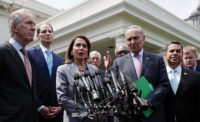Congress
Senate Democrats Propose $1 Trillion for Infrastructure in Direct Funding
Key GOP lawmaker objects to plan's tightening new tax breaks as 'pay-for'
Senate Democrats have put on the table a $1-trillion, 10-year infrastructure plan composed entirely of direct federal funding, a counterproposal to President Trump's $1.5-trillion blueprint, which includes just $200 billion in federal spending.
But the Democrats' way to offset their proposed infrastructure spending boost would be to tighten up on recently enacted tax breaks for corporations and wealthy individuals, a proposal that quickly drew sharp criticism from a leading Senate Republican.
Democrats say the Trump plan is flawed, because its direct spending would be negated by cuts in other infrastructure accounts. Introducing the Senate Democrats' plan on March 7, Minority Leader Chuck Schumer (D-N.Y.) said of Trump's framework, "Robbing Peter to pay Paul a pittance won't do nearly enough to rebuild our infrastructure."
But Senate Environment and Public Works Committee Chairman John Barrasso (R-Wyo.) blasted the Democrats' plan. He said in a statement, "If Chuck Schumer and the Senate Democrats spent more time working with Republicans on infrastructure and less time thinking of new ways to raise taxes on hard-working Americans, we would be making more progress."
Brian Turmail, a spokesman for the Associated General Contractors of America, said on March 8 via email, "There is a lot to like in the proposal, but it is difficult for us to see a path where Congress and the administration would end up supporting the 'pay-fors' outlined in the proposal."
Kristina Swallow, American Society of Civil Engineers president, said in a statement, "With both parties' leadership now putting forth infrastructure plans, it's time to turn this conversation into legislative action."
The largest shares of the Democrats' $1 trillion would be $140 billion in allocations for roads and bridges plus another $140 billion to solve the Highway Trust Fund's long-standing revenue shortage.
ASCE's Swallow and American Public Transportation Association CEO Paul Skoutelas noted the inclusion of the trust fund provision, something transportation and construction and engineering groups consider a high priority.
Other large allocations are $115 billion each for water and sewer systems and for public transit as well as $80 billion for the electric grid/clean energy.
School facilities and rail infrastructure each would get $50 billion.
The tax-related "pay-fors" include raising the corporate tax rate to 25% from the 21% level set in the Tax Cuts and Jobs Act, a change that would bring in an estimated $359 billion.
Democrats also would raise the top individual tax rate to 39.6%, from 37% under the tax-cut bill, signed into law on Dec. 22. That change would raise $139 billion over 10 years, the Democrats estimate.
In addition, Democrats propose restoring the alternative minimum tax for high-income individuals, which would raise an estimated $429 billion.
Democrats had rolled out a similar $1-trillion package in January 2017, with all its dollars direct federal spending. But they didn't propose offsetting revenue raisers.
The new version has some differences in how the total is divided. For example, it has $280 billion in highway-related funding, compared with $210 billion in the 2017 proposal.
Story updated on 3/9/2018 with comment from Associated General Contractors of America




